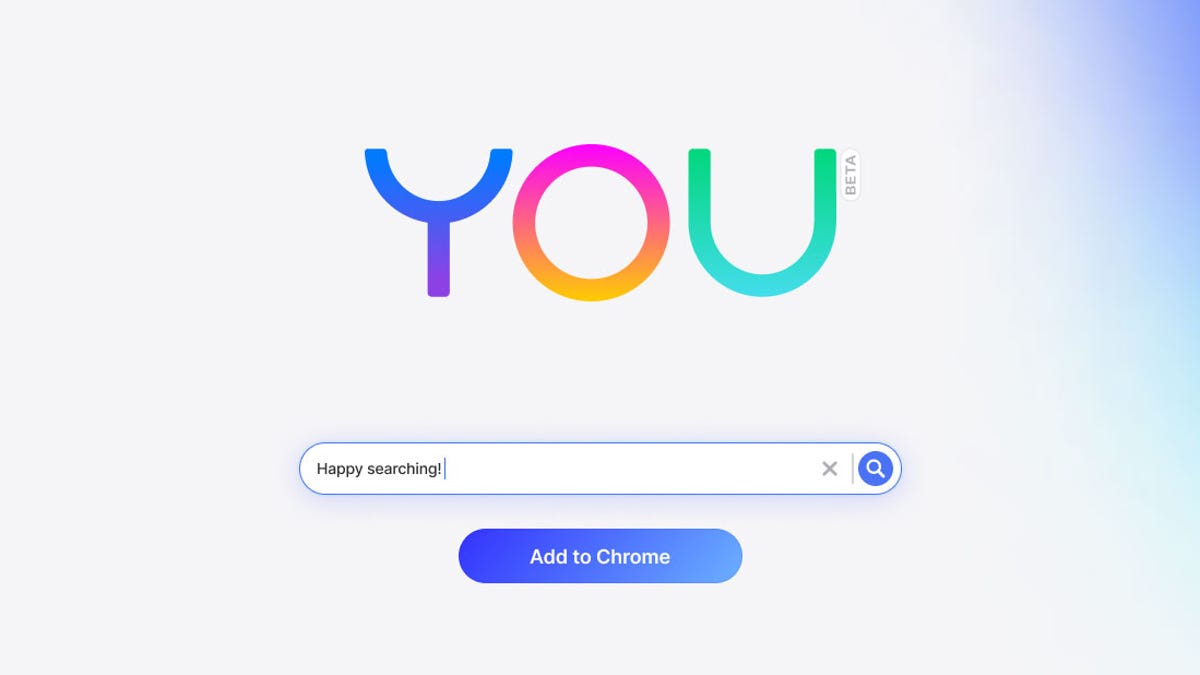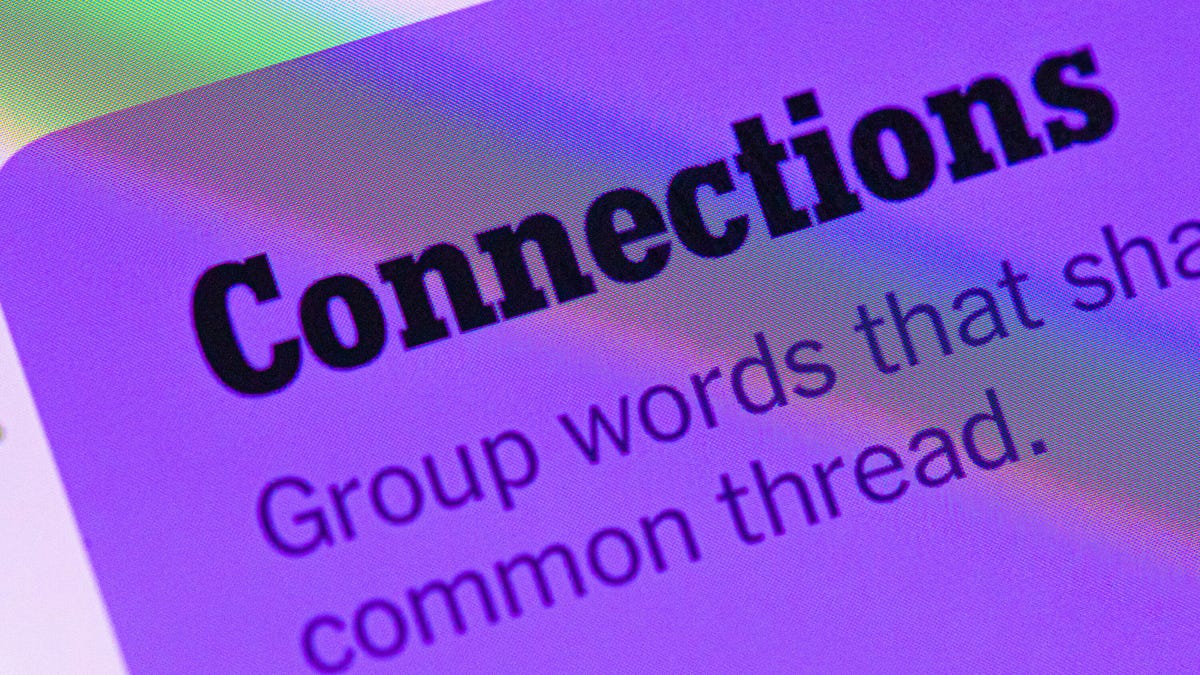Technologies
Search Engine You.com Launches ChatGPT-Style Chatbot
The feature works similar to OpenAI’s ChatGPT, which went viral earlier this year for its unique and realistic responses from a computer program.

You.com, a search engine launched last year promising more customizability, began offering a ChatGPT-style chatbot on its website Friday that can answer questions and hold a conversation, bringing more artificial intelligence-powered technology to the wider web. Though, it does offer some answers with incorrect facts.
The search engine’s new feature follows ChatGPT, an AI chatbot that went viral earlier this year for being able to offer unique answers to complex questions, based on information it gleaned from around the internet. You.com said it hopes to stand out though by offering answers to more-current questions, like, «Won the 2022 World Cup?» People who use the site should be careful though, as its confident answer appeared to get details wrong, like where the game was held.
ChatGPT has information only up to last year. You.com’s chat program is limited in other ways, however, and is seemingly unable to provide useful responses to requests like, «Write me a solitaire program in HTML for the web.»
Both chat programs do things like offer results from the web and repeat encyclopedia-like entries on various subjects. They can also write a letter in response to a prompt like, «Write me a letter to an old friend who I don’t really like but keep in touch with out of obligation.»
ChatGPT, You.com and other similar chatbots are part of a broader shift in the tech world, where artificial intelligence programs are increasingly being coded to create new forms of art, music, writing and even their own code. Their popularity and seemingly fast evolution has begun raising questions about what art is, and whether computers can truly create unique products drawn from a reservoir of information.
The sudden popularity of ChatGPT in particular has reportedly had alarm bells ringing at Google, which has built its corporate image around AI work like self-driving cars, real-time translation apps and smart assistants. The search giant has its own ChatGPT-like tech called LaMDA, which it’s resisted releasing publicly because of possibilities it might offer embarrassing answers or start repeating hate speech. Other chatbots, from Microsoft, Facebook and more, for example, have struggled with these issues.
For now, ChatGPT and You.com exist mostly as interesting demonstrations of what the future of AI could look like.
For example, when asked to write a haiku about Jamaican beef patties, You.com produced this novel result:
Flaky crust, so golden
Seasoned beef inside, so savory
A Jamaican treat
One other thing that separates the two chatbots for now is that You.com will display website results alongside its responses, something ChatGPT isn’t currently designed to do.
Technologies
Today’s NYT Connections Hints, Answers and Help for Feb. 28, #993
Here are some hints and the answers for the NYT Connections puzzle for Feb. 28 #993

Looking for the most recent Connections answers? Click here for today’s Connections hints, as well as our daily answers and hints for The New York Times Mini Crossword, Wordle, Connections: Sports Edition and Strands puzzles.
Today’s NYT Connections puzzle is pretty tricky. Both the blue and the purple categories really require you to look for hidden connections. Read on for clues and today’s Connections answers.
The Times has a Connections Bot, like the one for Wordle. Go there after you play to receive a numeric score and to have the program analyze your answers. Players who are registered with the Times Games section can now nerd out by following their progress, including the number of puzzles completed, win rate, number of times they nabbed a perfect score and their win streak.
Read more: Hints, Tips and Strategies to Help You Win at NYT Connections Every Time
Hints for today’s Connections groups
Here are four hints for the groupings in today’s Connections puzzle, ranked from the easiest yellow group to the tough (and sometimes bizarre) purple group.
Yellow group hint: When you really want something.
Green group hint: Flight attendants also.
Blue group hint: What’s your name?
Purple group hint: Stars and space.
Answers for today’s Connections groups
Yellow group: Craving.
Green group: Jobs that involve traveling.
Blue group: Name homophones.
Purple group: Astronomical terms plus a letter.
Read more: Wordle Cheat Sheet: Here Are the Most Popular Letters Used in English Words
What are today’s Connections answers?
The yellow words in today’s Connections
The theme is craving. The four answers are desire, itch, thirst and urge.
The green words in today’s Connections
The theme is jobs that involve traveling. The four answers are cruise director, pilot, roadie and salesman.
The blue words in today’s Connections
The theme is name homophones. The four answers are earnest, kneel, rustle and tailor.
The purple words in today’s Connections
The theme is astronomical terms plus a letter. The four answers are cometh (comet), Novak (nova), start (star) and sung (sun).
Toughest Connections puzzles
We’ve made a note of some of the toughest Connections puzzles so far. Maybe they’ll help you see patterns in future puzzles.
#5: Included «things you can set,» such as mood, record, table and volleyball.
#4: Included «one in a dozen,» such as egg, juror, month and rose.
#3: Included «streets on screen,» such as Elm, Fear, Jump and Sesame.
#2: Included «power ___» such as nap, plant, Ranger and trip.
#1: Included «things that can run,» such as candidate, faucet, mascara and nose.
Technologies
MWC Barcelona 2026: All the New Tech, Phones, Wearables and AI We Expect to See
This year’s Mobile World Congress starts Monday and will be packed with reveals from Xiaomi, Honor, Nvidia and more.

Every year, the moment we witness the very earliest signs of spring, CNET takes its cue to decamp to Barcelona for Mobile World Congress.
This is the world’s most important mobile show, and one of the most exciting events in the tech calendar. This year, we’re sending a bigger team to bring you all the news from the show as it happens.
It’s set to be a bonanza of new phones and wearables, with the odd robot thrown in for good measure. Sure, some of the fun tech we see at MWC never makes it out into the wider world, but we’ve also seen some of our most beloved tech debut at the show over the years — so expect a little of both.
Big themes are set to include AI and 6G, and with keynotes from SpaceX and Qualcomm, we’ll no doubt get a solid glimpse of the future of mobile. With Gemini in everything and satellite dominance on the horizon, it’s an exciting time for the industry.
Here’s more of what we expect to see.
What are the key dates for MWC?
MWC 2026 is set to run from March 2 to 5, although we’ll be in town a couple of days beforehand to report on some of the big launch events scheduled for this weekend. Don’t miss Xiaomi’s launch event on Feb. 28 and Honor’s event on March 1.
How to watch along
No matter how far away you live from Spain, there’s no need to feel like you’re missing out. The best place for all the latest MWC news is on our CNET live blog.
We’ve been attending this show for decades (this is MWC’s 20th year in Barcelona, by the way), and we have a team of experienced reporters and reviewers on the ground.
We’ll show you everything we deem interesting and important, and we’re not just admiring new products from afar. We’re touching, tinkering with and trying not to drop them, so be sure to follow us across Bluesky, Instagram, TikTok, X and YouTube, too.
What phones to expect at MWC 2026
For the past few years, Chinese phone-makers have dominated MWC, and 2026 looks to be no different.
The first big phone launch event is scheduled for 6 a.m. PT Saturday, Feb. 28, when we expect Xiaomi to unveil its latest camera-focused flagship. We loved the Xiaomi 15 Ultra, and the 14 Ultra before it, so we’re excited to see what the company has in store for us. A teaser image hints at its partnership with premium camera brand Leica and promises a «new wave of imagery.»
Next up, we have Honor on Sunday, March 1, when the company has said it will unveil its Magic V6 phone, alongside the MagicPad 4 and MagicBook Pro 14. Perhaps more exciting still, Honor has said it will give us a first glimpse of a working version of its Robot Phone, and will also unveil a humanoid robot at its event.
For other phone-makers, MWC is likely to serve as more of a victory lap for its existing devices — particularly Samsung, which held its own event in San Francisco this week to unveil the flagship S26 series. Motorola will be in town, likely showing off its Razr, which just like the Samsung Galaxy TriFold, has yet to be seen much in Europe.
On the whole, MWC 2026 is likely to be a big show for foldable phones, which, according to Ben Wood, CMO and chief analyst at CCS Insight, «is now becoming quite a mature category.»
Another major trend in the phone space is likely to be a focus on batteries, particularly silicon carbon-based tech, Wood said in an MWC preview session. «We’re expecting to see phones with some of the biggest batteries we’ve seen for a long time, [with] fast charging — perhaps 300-watt charging — being introduced,» he added.
What other tech to expect at MWC 2026
After the early flops that were the Humane AI Pin and the Rabbit R1, we’re seeing more companies moving to jump on the wearable AI bandwagon. We expect to see a number of devices and demos pop up at MWC — perhaps trying to beat OpenAI and Jony Ive to the punch.
This will include AI- and AR-based glasses, said CCS Insight analyst Ben Hatton during the firm’s briefing session. «We are expecting to see a huge number of glasses on show this year, not just from Meta, but also from the smaller players, [like] TCL and Oppo, looking to take a slice of the pie,» he said.
One of the key challenges for these companies will be differentiation, Hatton said. «Ultimately, there’s still a long way to go before these become generally mass market products,» he added, pointing out that at this stage, compelling use cases are still a bit thin on the ground.
It’s been two years since Samsung launched the Galaxy Ring at MWC, and smart rings have been fairly thin on the ground ever since — although Oura CEO Tom Hale is slated to speak at the show. We’re not necessarily expecting to see any new rings this year, but there’s always an outside chance.
Much more likely to show up are a slew of new laptops and tablets. They rarely get top billing at MWC, but we’ll keep an eye out for the most exciting launches. There’s also likely to be some intriguing concepts on show from the likes of Lenovo and Samsung Display, which is responsible for the tech behind the new Galaxy S26 Ultra’s scene-stealing Privacy Display.
The big themes: AI, 6G and beyond
No surprises here that AI will, of course, be a major theme at MWC. For the past few years, Google has dominated the AI conversation at the event by showcasing Gemini’s capabilities and its widespread integration. Will this year be any different? Probably not, but that doesn’t mean the AI conversation has stalled.
We expect to see more sophisticated AI agents that are more deeply integrated into wearables, offering live translation, more actionable health insights and more personalized experiences. Some of the biggest players in the AI game will be present, including Nvidia and Qualcomm, on the hardware side. They’ll likely have saved some juicy announcements for the show and, hopefully, have some exciting demos we can try out.
Wind the clock back a decade, and everyone was talking about 5G and what a dramatic difference it was going to make to our lives. Now that 5G is old news, we’re looking forward to 6G. Most discussions about 6G so far have focused on its impact on the industry, but that doesn’t mean there’s nothing to be excited about.
At the Web Summit in November, Qualcomm CEO Cristiano Amon told me that 6G will make our phones faster than ever and connect us to an «always-sensing network.» This could include wearables, smart devices, cars and even robots. No doubt, Amon will expound on this subject further during his MWC keynote, which is all about 6G and AI.
Another theme likely to be prevalent at the show is the role of satellites in enhancing network connectivity. SpaceX President Gwynne Shotwell will be on stage to talk about Starlink, and all the world’s biggest carriers will have their own booths where they’ll show us what they’re doing to tap into the latest network technologies.
Technologies
Today’s NYT Mini Crossword Answers for Saturday, Feb. 28
Here are the answers for The New York Times Mini Crossword for Feb. 28.

Looking for the most recent Mini Crossword answer? Click here for today’s Mini Crossword hints, as well as our daily answers and hints for The New York Times Wordle, Strands, Connections and Connections: Sports Edition puzzles.
Need some help with today’s Mini Crossword? As is usual for Saturday, it’s pretty long, and should take you longer than the normal Mini. A bunch of three-initial terms are used in this one. Read on for all the answers. And if you could use some hints and guidance for daily solving, check out our Mini Crossword tips.
If you’re looking for today’s Wordle, Connections, Connections: Sports Edition and Strands answers, you can visit CNET’s NYT puzzle hints page.
Read more: Tips and Tricks for Solving The New York Times Mini Crossword
Let’s get to those Mini Crossword clues and answers.
Mini across clues and answers
1A clue: Rock’s ___ Leppard
Answer: DEF
4A clue: Cry a river
Answer: SOB
7A clue: Clean Air Act org.
Answer: EPA
8A clue: Org. that pays the Bills?
Answer: NFL
9A clue: Nintendo console with motion sensors
Answer: WII
10A clue: ___-quoted (frequently said)
Answer: OFT
11A clue: With 13-Across, narrow gap between the underside of a house and the ground
Answer: CRAWL
13A clue: See 11-Across
Answer: SPACE
14A clue: Young lady
Answer: GAL
15A clue: Ooh and ___
Answer: AAH
17A clue: Sports org. for Scottie Scheffler
Answer: PGA
18A clue: «Hey, just an F.Y.I. …,» informally
Answer: PSA
19A clue: When doubled, nickname for singer Swift
Answer: TAY
20A clue: Socially timid
Answer: SHY
Mini down clues and answers
1D clue: Morning moisture
Answer: DEW
2D clue: «Game of Thrones» or Homer’s «Odyssey»
Answer: EPICSAGA
3D clue: Good sportsmanship
Answer: FAIRPLAY
4D clue: White mountain toppers
Answer: SNOWCAPS
5D clue: Unrestrained, as a dog at a park
Answer: OFFLEASH
6D clue: Sandwich that might be served «triple-decker»
Answer: BLT
12D clue: Common battery type
Answer: AA
14D clue: Chat___
Answer: GPT
16D clue: It’s for horses, in a classic joke punchline
Answer: HAY
-

 Technologies3 года ago
Technologies3 года agoTech Companies Need to Be Held Accountable for Security, Experts Say
-

 Technologies3 года ago
Technologies3 года agoBest Handheld Game Console in 2023
-

 Technologies3 года ago
Technologies3 года agoTighten Up Your VR Game With the Best Head Straps for Quest 2
-

 Technologies4 года ago
Technologies4 года agoBlack Friday 2021: The best deals on TVs, headphones, kitchenware, and more
-

 Technologies5 лет ago
Technologies5 лет agoGoogle to require vaccinations as Silicon Valley rethinks return-to-office policies
-

 Technologies5 лет ago
Technologies5 лет agoVerum, Wickr and Threema: next generation secured messengers
-

 Technologies4 года ago
Technologies4 года agoOlivia Harlan Dekker for Verum Messenger
-

 Technologies4 года ago
Technologies4 года agoiPhone 13 event: How to watch Apple’s big announcement tomorrow
